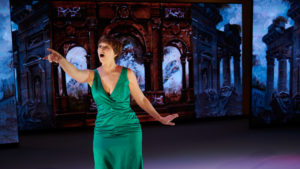
Haymarket Opera Company 2020-21 Review: Apollo e Dafne
An Inspiring & Relevant Modern Production of the Handel’s Eternal Masterpiece
By Polina Lyapustina(Photo: Anna Cillan)
Coming back for more Haymarket performances, after the astonishing “Acis and Galatea” presented this late autumn, was both exciting and a little jittery.
The concept of Haymarket season as announced was very integral. The audience would be presented with three filmed performances of Handel’s operas, produced in collaboration with Resolution Studios, in a set designed by Zuleyka V. Benitez. And having watched one of such high quality, it was so easy to fall prey to expectations.
But sure enough, as I opened the page and read the prepared material, almost immediately, I anticipated how Handel’s masterwork would unfold in full force in these conditions. The consistency of Haymarket’s approach and fidelity to their own beliefs and aesthetics created a perfect foundation for revealing old myths in contemporary realities.
Renewed Hope
Reading about other performances of this cantata, I often noticed that when asked about their favorite part of “Apollo e Dafne,” numerous musicians immediately answered — the Overture. Although the original music has not survived, some other composer’s instrumental works are sometimes performed as an introduction.
For this performance, the orchestra performed the overture to “Agrippina“ to paint a musical picture of the victory of Apollo over the serpent. Haymarket knows how to make this music work – it’s the company’s victory too. The most memorable moment for me came in the second minute of the overture when first violin, Wendy Benner launched into a flurry of sixteenth-note runs, followed swiftly by another first violin, Jeri-Lou Zike, before it all culminated in the remaining orchestra members joining in. It was overwhelming in its glorious execution.
Intermittent shots of the playing orchestra and the art pieces from the set complemented each other perfectly. It’s still not easy for the orchestra members, but I’m happy to note, that the musicians’ mood certainly changed for the better. When I saw them in “Acis and Galatea,” I couldn’t take my eyes of those people struggling to do their best in this new and uncomfortable reality. In watching “Apollo e Dafne,” I saw them confident, showing their best without that exhausting struggle.
Heroes of Our Time
Ryan de Ryke portrayed a modern Apollo. The modern God is strong, precise, and confident, as demonstrated by the versatile voice of the baritone, and yet with a help of his acting talent, de Ryke hinted that he is not to be trusted.
Erica Schuller’s Dafne was multidimensional. Her bright and vivid voice is a symbol of goodwill and unity with the world around her. When alone, her agile voice found an instrument to harmonize with on every matter and emotion, expanding and making the world around her almost tangible. But in the duet, she stood on her own, while the instruments followed Apollo’s vocal line. And then, alone with herself again, only elegant and fluid oboe playing accompanied her hopes of salvation against a backdrop of disturbing strings.
Today, we can all reflect on the destiny of Dafne, who had to sacrifice her living to preserve her primary values, the destiny she never deserved. And we have numerous reflections of this in our own world, including the #metoo movement and the unjust laws towards women in Europe, Russia, and throughout the world. We also see this in the pandemic restrictions, which none of us is (or will be, for a few more years) able to evaluate fairly. But the inner fight and determination of Dafne, so genuinely portrayed by Schuller, guided and inspired us.
Overall, this performance is another modern success for the baroque opera company, from the choice of this Handel cantata to the producers’ approach to how to highlight both the reflection of the eternal wisdom in our times and the realities of the modern opera company’s work.
This one-hour production guided others to a position of empowerment in the face of life’s hardships, which at first sight lie on a completely different plane from Handel’s piece. And yet, this opera certainly lives in the modern world. And when we are allowed to see every detail in this mechanism, when we see not only the play but the efforts, emotions, excitement, and responsibility of real people behind it, we start believing that we can do what’s important and desired, though it might feel so inappropriate in our times of crisis.


